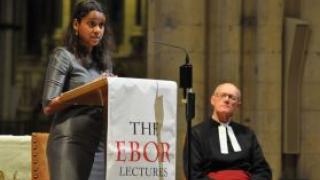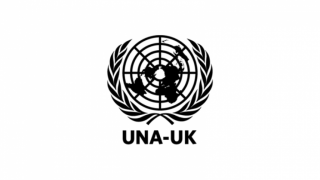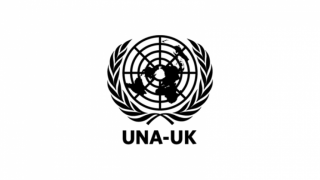
On 9 September Natalie Samarasinghe, Executive Director of UNA-UK, opened the new series of Ebor Lectures in York Minster by reflecting on the achievements of the United Nations as it approaches its 70th birthday. Her speech served as a reminder to members of the British public that in a world confronted by crises that cross borders, we all have a stake in investing in global solutions.
Natalie used the prestigious event to focus on the Organisation's valuable contributions to society - from feeding around 90 million people each year, to vaccinating almost half of the world's children against deadly diseases. She remarked that its 70-year expenditure of half a trillion dollars, which recently came under fire in the press, is a relatively small price to pay:
"Even if the UN had spent 10 times this amount, it would still be value for money. Should we really try to put a price on the millions of lives it has saved, on the conflicts it has prevented, on the standards and mechanisms it has developed to protect us and make our lives easier, from human rights to aviation regulations to functioning mail and satellite systems?"
Despite its successes, Natalie acknowledged that the UN needs to become more effective. With ongoing conflict in the Middle East and North Africa and the biggest refugee crisis since World War II, the capacity of the Organisation to respond when it matters has been disputed:
"The fact remains that on the hardest issues – when powerful states have particular interests, such as Syria; when too many states are not interested enough, such as the early stages of the Ebola crisis; or when too few states are willing to fulfill their international responsibilities – the UN is unable to make headway."
However, Natalie observed that the UN's failures are the consequence of an "in-built catch" - the fact that it is composed of 193 member states which have different, and often conflicting, short-term interests. She went on to explain that the success of our global system rests on the will of its members to balance the UN's long-term goals with their own national interests.
As a permanent, veto-wielding member of the UN Security Council, the UK is a key player in determining the effectiveness of the United Nations. According to Natalie, this is not just a matter of international obligation, but of British interest:
"The UK should acknowledge the importance of an effective United Nations to the UK’s national security and prosperity. It should develop a proactive and imaginative strategy for increasing the UN’s effectiveness. It should provide greater practical support for the UN, notably to peace operations – where UK personnel numbers are at a 20-year low. And it should set out its vision for the system going forward."
Natalie concluded by reminding the audience that a more forward-thinking, strategic UK foreign policy will only be developed if there is sustained public demand for it:
"We hope that the UN’s 70th anniversary – and the crises it is currently seeking to address – will spark meaningful debate in the UK, not just about what kind of country we want to be, but what kind of world we want to build."
Click here to read the full speech
The next lecture in the series will be delivered by Lyse Doucet, the BBC's Chief International Correspondent, on 21 October.






